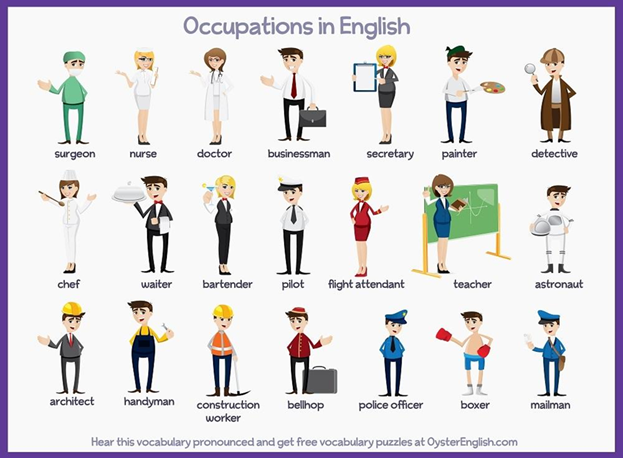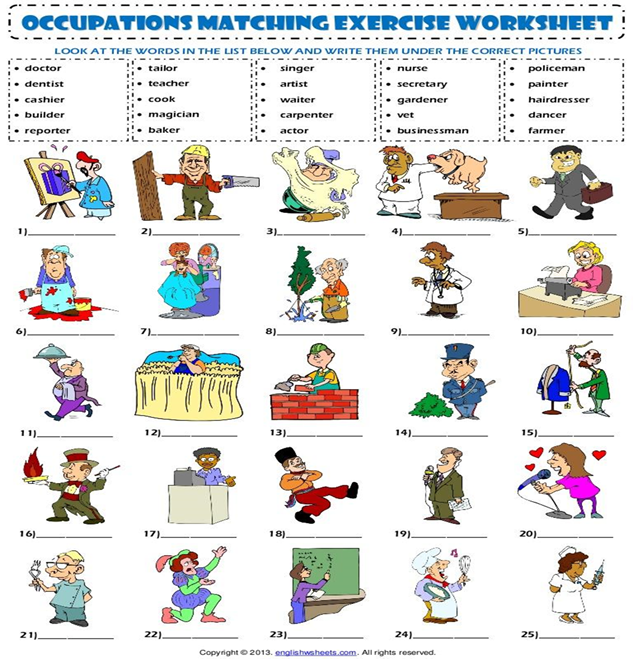AULA 07/2023 – Occupations / Simple Present, Present Continuous - 24/04/2023

Vocabulary:
Surgeon: cirurgião Astronaut: astronauta
Nurse: enfermeiro (a) Architect: arquiteto
Doctor: doutor (a) Handyman: faz-tudo
Businessman: empresário (a) Construction worker: trabalhador na construção
Secretary: secretária (o) Belhop: mensageiro de hotel (carregador)
Painter: pintor (a) Police officer: policial (a)
Detective: detetive Boxer: boxeador (a)
Chef: chefe de cozinha Mailman: carteiro (a)
Waiter: garçom/ garçonete Bartender: bartender
Pilot: piloto Flight attendant: aeromoça
Teacher: professor (a)

ACTIVITIES (ATIVIDADES)
- Sabe-se que a Língua Inglesa está presente em todos os países do mundo inteiro. As marcas do quadro ao lado se encontram no Best Global Brands, que é responsável pela pesquisa das 100 marcas de maior valor no mundo. Diante dessa pesquisa, aponte as marcas que fazem parte do seu cotidiano escritas em inglês.
Disponível em: https://www.pinterest.ph/pin/561261172304789572/ Acesso em 27 de abr. de 2020.
LEMBRANDO:
O Simple Present trata do presente simples, que corresponde ao Presente do Indicativo da língua portuguesa. Este tempo verbal serve para indicar ações habituais que ocorrem no presente, fatos gerais, ações repetidas ou situações, características físicas, emoções e desejos permanentes.
Já o preseent continuous descreve uma ação que está ocorrendo no presente, seja no momento em que se fala ou sobre um fato que acabou de acontecer. Servem também para ações consecutivas, situações temporárias pelas quais alguém está passando ou que acabaram de acontecer e continuarão acontecendo.
2. Read the text and answer the questions in English in your notebook. (Leia o texto e responda as perguntas em inglês em seu caderno.)

Marcos is a doctor. He looks after sick people. He usually gets up at six thirty (6:30). Today, he is late, it is 7 o’clock and he is still at home. He usually goes to work by bus, but today he is driving his car. Now, it is seven fifteen (7:15) and he is driving his car.
He always arrives at the hospital at half past seven (7:30), but today he is getting at the hospital at seven forty-five (7:45).
He always has lunch at midday (12 o’clock). It is midday, but he is not having lunch. He is taking care of sick patients.
Vocabulary
Sick: doente Usually: geralmente
Gets up: chegar Late: tarde
To work: trabalhar Drive: dirigir
Arrives: chegar Lunch: almoçar
Talk: falar Patients: pacientes
a) What does Marcos do?
b) What time does he usually get up?
c) How does he usually go to work?
d) What is he doing at midday today?
3. Mark an X TRUE or FALSE according to the text. (Marque um X no verdadeiro ou falso de acordo com o texto.

4. You noticed, in the text, that the verbs are in the Simple Present or in the Present Continuous. (Vocês observaram, no texto, que os verbos estão no Simple Present ou no Present Continuous.) Now, it is your time to rewrite these sentences in the graphic below. (Agora, é a sua vez de reescrever essas sentenças no gráfico a seguir.)

5. Look at the pictures and answer the questions in English. (Olhe as figuras e responda as perguntas em inglês.)

a) What are they doing now?
b) Are they watching TV?

c) Is he working at a bank?
d) What is he doing at this moment?

e) Is she dancing?
f) What is she doing?
6. Look at the pictures and answer the questions in English about the names of the professions. (Olhe as figuras e responda as perguntas em inglês sobre os nomes das profissões em inglês.)
